In 1812, My 5th great-grandfather, Roelof Van Houten, purchased the property where Van Houten Farms now operates, and Van Houtens have been farming on this property ever since. In 1946, after coming home from WWII, my grandfather, James Van Houten, started Van Houten Farms as a dairy farm, then known as Van Houten’s Dairy. After about 10 years the farm evolved from dairy into a produce farm. Shortly after, the farm stand was added. Eventually, the farm evolved into the garden center, plant nursery, and farm stand that it is today.
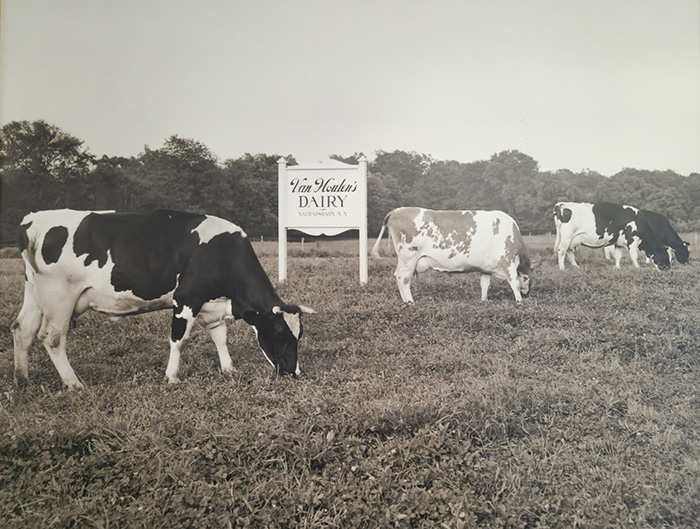 James’ cows around what is now our nursery circa 1950 |
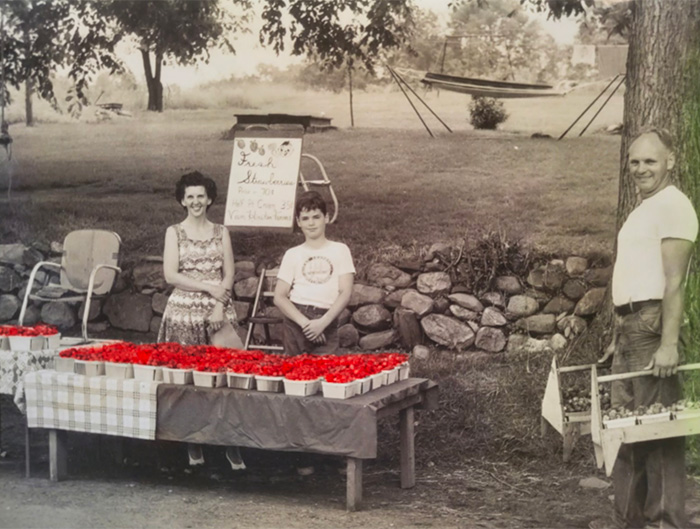 Our original farm stand. James started in the produce business by selling strawberries and cream in front of his house in the early 1950’s. Pictured here are James and Kay Van Houten, and their oldest son, Jim. |
While Roelof and his progeny at one point owned hundreds of acres in the town, by the 1960’s, due to development, tillable land had grown quite scarce. Most of James’ fields had become the reservoir named Lake Tappan. He was forced to drive his equipment further and further up the county in order to find fields to rent and farm. In 1970, the decision was made to purchase 300 acres in Orangeville, Pennsylvania and move most of the growing operation there. Since then, most of the produce and plants that we sell are grown by us at our Pennsylvania location, while we still grow as much as our remaining property allows us here in Pearl River, including potted roses, hydrangeas, perennials, greenhouse tomatoes, and, most recently, an experimental greenhouse strawberry crop.
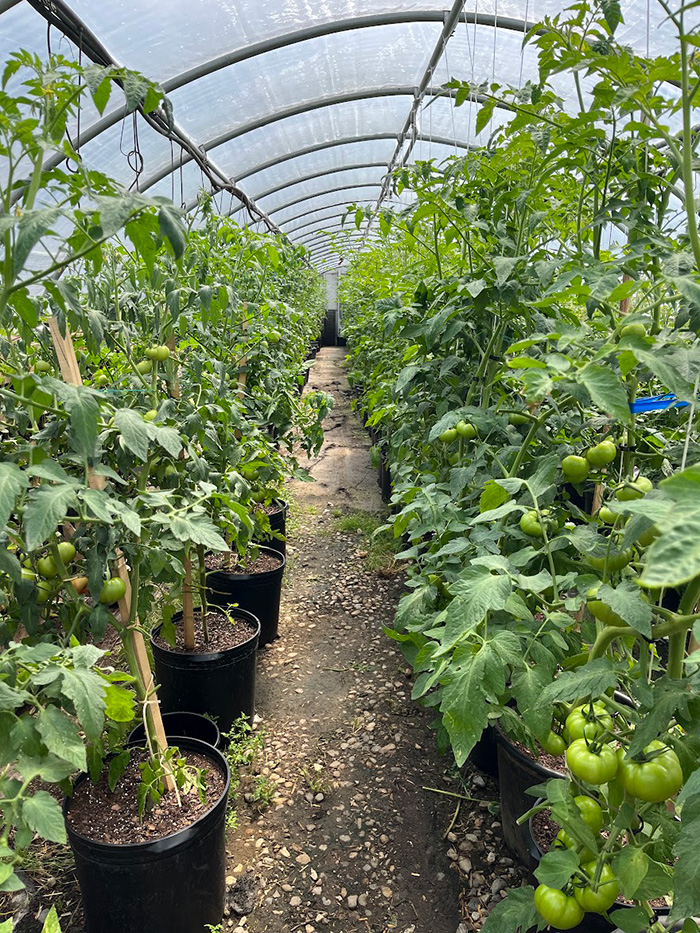 This year’s greenhouse tomato crop here in Pearl River This year’s greenhouse tomato crop here in Pearl River |
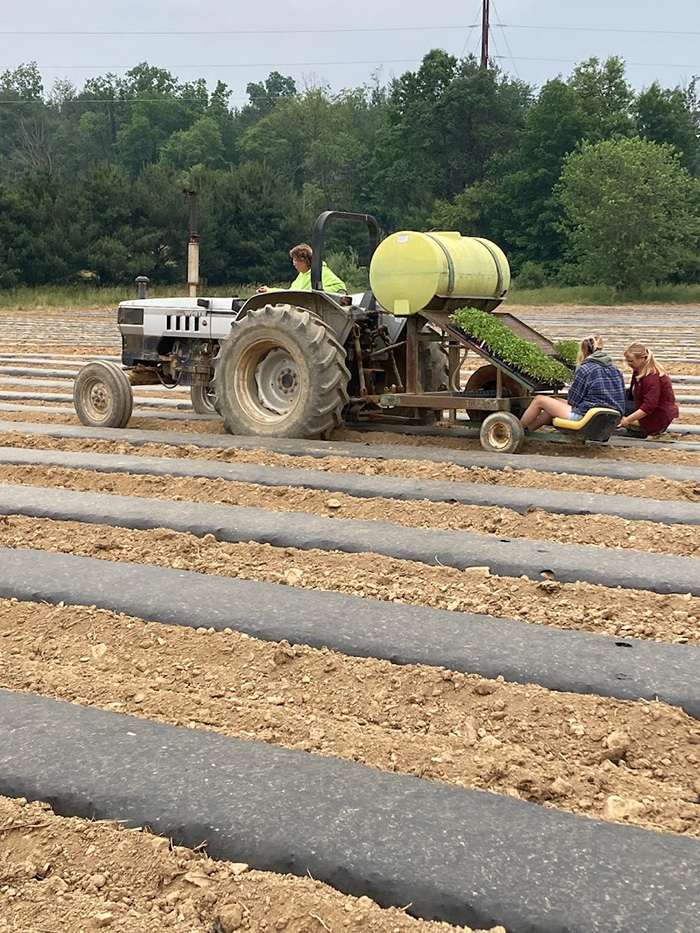 The crew planting tomatoes this past spring at our Pennsylvania location. The crew planting tomatoes this past spring at our Pennsylvania location. |
This business model worked well for the farm for a generation. The success of the farm in fending off the continued onslaught of development is a testament to its ability to evolve and remain relevant. Van Houten Farms, as well as every family farm in the State of New York, and throughout the country, must evolve and change with the times in order to survive and thrive. Every year, hundreds of family farms go out of business in NY State alone, largely due to the failure or inability of those farms to evolve.
By the mid-2010’s, however, it was time for the next evolution of Van Houten Farms. The farm had been in steady decline for several years. Most of the farm stands and garden centers that existed at one time in Rockland County, not to mention the surrounding counties and all of New York State, had fallen victim to the challenges created by changing shopping habits and increased operating expenses, largely due to the pressures of development. In 2017, Van Houten Farms had declined to the point where it was no longer economically sustainable and was headed towards failure. The decision was made to revitalize the business by reinvesting, updating, and diversifying.
One of the most significant improvements we made to the farm was the addition of Rockland Cider Works, in 2019. Rockland Cider Works is a New York State farm cidery that produces hard cider from 100% New York State apples, most of which come from right here in Rockland County. The cider we produce and sell is a state defined New York agricultural product. The cidery seemed to be the long sought after missing piece that allowed us to fill the deepening gaps between our busy seasons, by not only increasing customer traffic and sales, but also utilizing our overhead and labor expenses over a much longer period of the year.
Local hard cider; some live music; a bite from a food truck; local fruit, cheese, and cured meats from our farm stand; all in a mellow, outdoor rural setting. This was Rockland Cider Works. The cidery had an instant positive impact on not only our business, but on the community as well. More customers came to the farm throughout much of our traditionally slow periods. And during our busy seasons, especially the fall, the cidery gave us much more to offer customers visiting the farm, resulting in a resurgence and increased activity that the farm hadn’t seen since the 1960’s. Countless customers, many of whom hadn’t been to the farm in years, or even decades, thanked us, some literally in tears, for bringing the farm back to life and providing a small rural oasis in an otherwise heavily developed suburb where they could gather to visit with family, friends, and neighbors. The farm had again become a destination for adults and kids (along with the family dog) to shop and enjoy themselves in a positive, healthy, outdoor environment. This type of resource does not exist anywhere else in Orangetown.
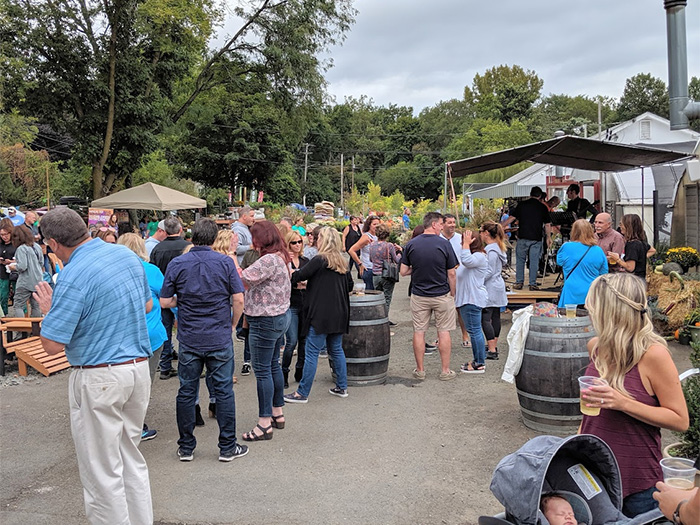 A fall weekend at Van Houten Farms during the early days of Rockland Cider Works. The cidery helped to bring back crowds that the farm had not seen in decades and was an immediate and desperately needed boon to the farm’s business. |
Other local businesses benefited as well. After sharing a drink and snack at the farm with friends and family and spending an hour or two out in the fresh air, most customers were ready for dinner. The farm and cidery closed at 7:00 pm, too late to go home and make dinner on a weekend night, but the perfect time to head to a nearby restaurant. And not just locals, but our staff regularly directed customers who were visiting from the city, Westchester, and Bergen County, who had come to Orangetown specifically to spend the afternoon at our farm and cidery, towards restaurants and bars in Pearl River, Blauvelt, and Piermont.
COVID put us in a unique position. For a few months during the summer and fall of 2020, Van Houten Farms became the center of the community. Our greatly expanded farm stand was a lifeline for many customers who had limited access to fresh foods. Our garden center provided the plants that allowed thousands of community members to find solace in their lawns and gardens while stuck at home. And our farm cidery provided the first opportunity in months for many residents to visit with their family, friends, and neighbors in a safe, outdoor, spaced environment. The outpouring of heartfelt support and gratitude we received from community members was overwhelming and helped make all the long hours and hard work worth the effort.
As the answer for keeping our farm viable and relevant for another generation, and with overwhelming community support, our farm cidery appeared to be a great success story for both Van Houten Farms and the Town of Orangetown. However, one neighbor who apparently preferred seeing our farm in decline has waged a personal vendetta to get us shut down. He has used lies, baseless defamatory allegations, gross speculations and exaggerations, fearmongering, and conspiracy theories in his fanatical attempt to build opposition against our farm. While he has gathered just a small handful of followers, his incessant complaining and false rhetoric has led to a very costly and stressful legal battle over the past 3 years that eventually resulted in a court order shutting down our cidery earlier this year, placing the future of the entire farm in great jeopardy.
A retail farm stand cannot survive on the revenue generated from the traditional plant, produce, pumpkin, and Christmas tree selling seasons alone; that business model is no longer sustainable. The gaps between the few busy weeks of the year have grown too deep to fill. With the ever-increasing costs of doing business (property taxes, labor costs, fuel, cost of merchandise and inputs for everything we grow), it is a constant challenge to keep the farm profitable. It is as vital as ever for farms to continue to evolve and diversify. This is precisely the purpose of our cidery. Not only does it give us the ability to produce another New York State agricultural product for us to sell, but it is also a source of agritourism, which brings more people to the farm to buy all the products we have to offer. Agritourism has become a vital part of farm operations all throughout the country, especially in New York State. There is no farm stand in Rockland County still in operation today that does not rely in part or mostly on agritourism.
The cidery provides a buffer against poor weather and raising overhead costs, limiting factors that we have no control over, by extending our seasons and providing more of a consistent and steady income. From June through October of this year, over 3000 less customers have come to the farm than in the same period last year when the cidery was still open. We need more customers coming to the farm throughout more times of the year if there’s any hope for the farm to continue to be here. We fully understand and appreciate the challenges this may present. That’s why, going back to the very first days of the cidery, we have been continuously recognizing and mitigating all opportunities for problems. And now, this proposed zoning text amendment officially provides legal parameters, most of which we had already been following voluntarily, in which we can operate the cidery that address any reasonable concerns and are mutually agreeable to both us and the town.
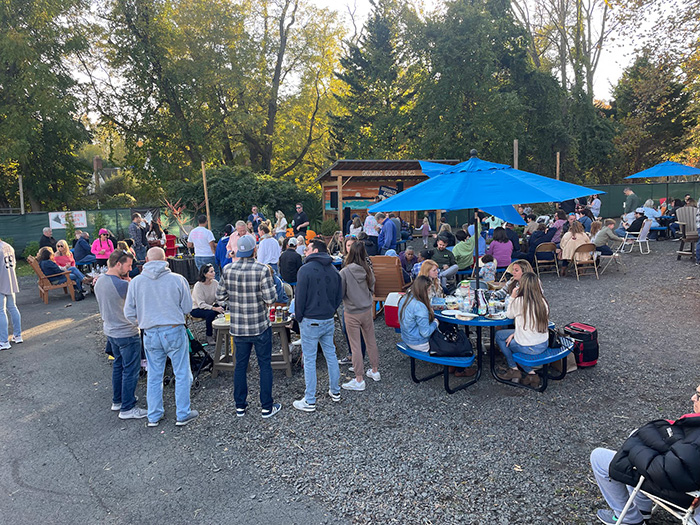 A perfect fall day at the farm. On this day in 2022, the farm stand made 248 sales, in addition to 425 at the cidery. On this same day this year, without the cidery being open, we made a total of just 78 sales. The farm needs to look like this picture during our busy season if there is any hope for its continued survival. |
Today, Van Houten Farms is one of the last 3 remaining family farms in Rockland County. Rockland Cider Works is an integral part of the future of Van Houten Farms that can help guarantee it remains a viable part of the community for another generation, as it has been for hundreds of years, while also helping to protect the history and some of the last remnants of the area’s agricultural heritage.


